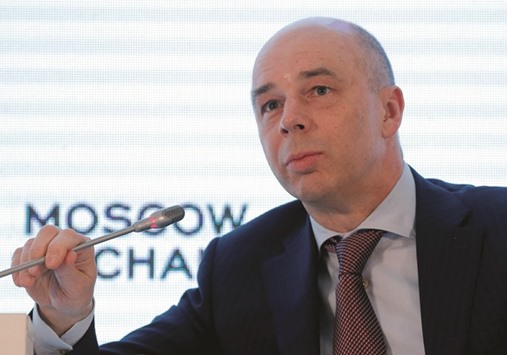Russian Finance Minister Anton Siluanov said yesterday that the budget deficit could reach up to 4% of gross domestic product this year if oil prices stay at current levels.
“The task we are setting for ourselves is to have a budget deficit at 3% of GDP under (an oil price of) $40 (per barrel),” Siluanov told an economic conference.
“(But) if the oil price is as it’s shaping up now - $32-33 - accordingly, it (budget deficit) will be up to 4% of GDP,” he said.
Siluanov added that the finance ministry would have to increase its borrowing volumes in the near future to cover the hole.
Hit by falling crude prices – the country’s main exports, which together with a small basket of other commodities make up half of the government’s revenues – and Western sanctions imposed on Moscow over Ukraine, Russia faces a second year of recession. That is not good news for the Kremlin and President Vladimir Putin ahead of the parliamentary election slated for autumn.
Worse-than-expected oil prices, limited access to foreign financial markets and lack of funds to revive the economy have forced the finance ministry to redraft the budget, initially based on oil prices of $50 per barrel.
Typical amendments to the budget take place in the spring, but two sources told Reuters that this election year any changes are unlikely before the new parliament is chosen and settles in.
The amendments would require slashing revenues by some 700bn roubles to 800bn roubles ($10.56bn to $12.09bn, according to various estimates, in order to keep deficit manageable. The budget approved in October envisaged total spending at 15.9tn roubles.
With oil around $40, revenues, initially expected at around 14tn roubles, could come short some 1.2tn roubles - 1.5tn roubles, Siluanov told Reuters in an interview late last year.
When oil fell below $30 a barrel earlier this year, the government began working on a cost-cutting plan, with ministries ordered to reduce spending by 10%. Even defence spending - which for years kept increasing - fell victim, with some 5% cuts ordered.
Most analysts see a rather significant contraction in the economy this year, following the 3.7% decline last year. The World Bank warned last week the economy may fall 1.9% this year.
But the economy ministry envisages GDP falling by modest 0.3% in 2016 and an expansion of 1.4% next year.
Simply returning to growth is not the point, however, analysts warn, criticising Russia for year-long negligence to diversify the economy away from hydrocarbons.
“The point is not whether the economy minimises the decline this year and returns to growth in 2017, but more importantly whether the government can implement policies which create new drivers of longer-term growth that lead to economic diversity,” Chris Weafer, a senior partner in Macro-Advisory consulting group, wrote in a recent note.
Meanwhile the Russian central bank governor Elvira Nabiullina warned yesterday against taking risks with inflation in order to speed up growth, saying that could lead to an “inflationary spiral” that could later harm economic prospects.
Russia’s economy contracted by 3.7% last year, and the central bank expects it to contract by 1.3-1.5% this year. The central bank has kept its key interest rate unchanged at 11% since July 2015 in a bid to bring inflation down.
“What is being suggested - to speed up economic growth by inflation - this is a big, big illusion,” Nabiullina told a conference.
“In the end this will be an inflationary spiral, dollarisation, an increase in risks in investment projects and we will receive a long-term economic fall instead of growth.”
Some officials have called for the central bank to be more aggressive in cutting the key rate.
But the bank has preferred to be cautious, citing risks including oil market volatility.
Inflation fell to 7.3% in March from 8.1% in February, having fallen from 12.9% in December.
The central bank expects inflation at 6-7% this year and aims for 4% by the end of 2017.
Nabiullina said the goal to lower inflation should allow the Russian economy to develop in a “healthy” way.

Siluanov: Setting a lower deficit target.
